A Detailed Analysis of White Collar Crimes and Canadian Legislation
VerifiedAdded on 2022/09/29
|13
|2605
|27
Essay
AI Summary
This essay provides a comprehensive analysis of white collar crimes within the Canadian context. It begins by defining white collar crime and highlighting its various forms, including fraud, money laundering, and corporate misconduct. The essay then explores the prevalence of these crimes in Canadi...
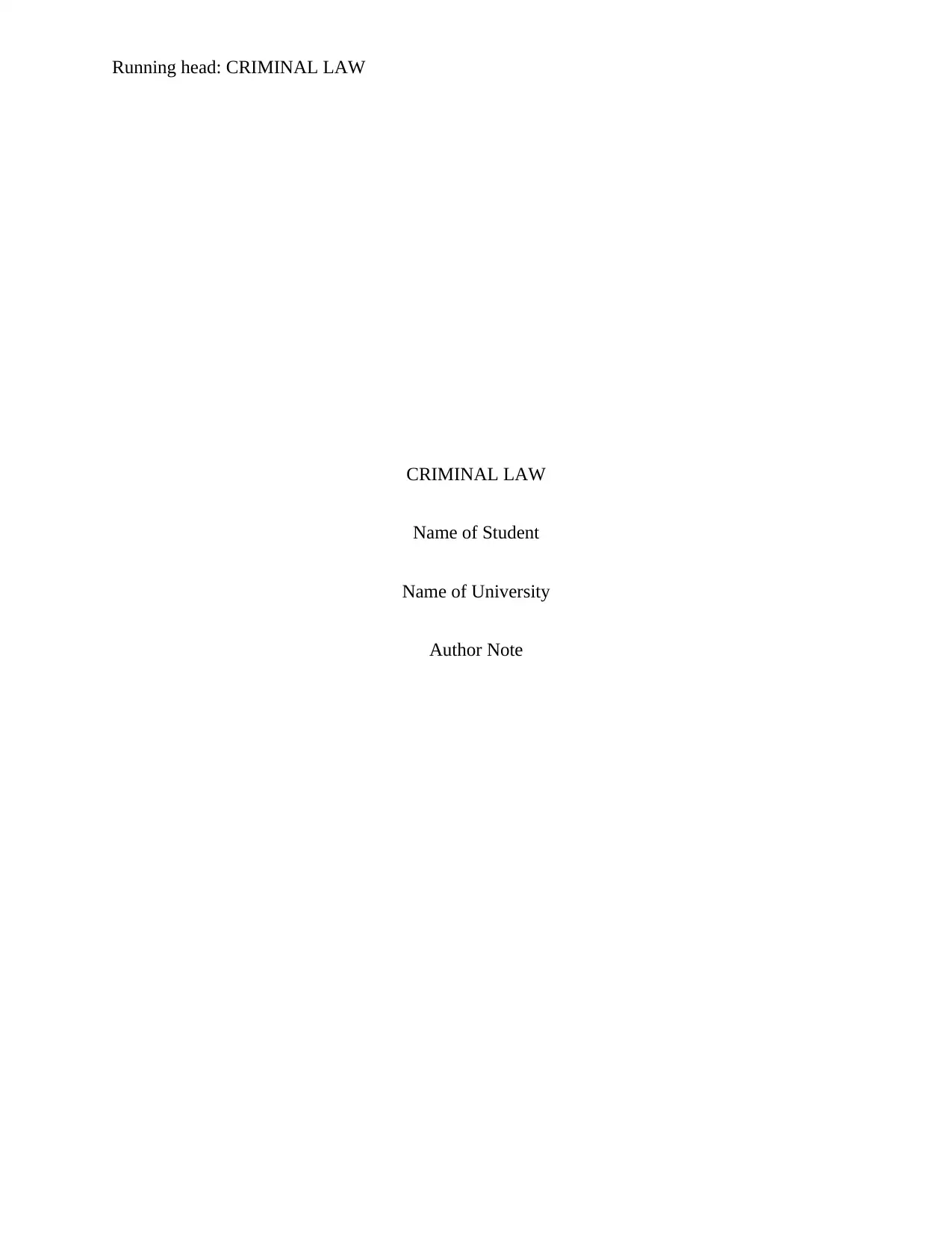
Running head: CRIMINAL LAW
CRIMINAL LAW
Name of Student
Name of University
Author Note
CRIMINAL LAW
Name of Student
Name of University
Author Note
Paraphrase This Document
Need a fresh take? Get an instant paraphrase of this document with our AI Paraphraser
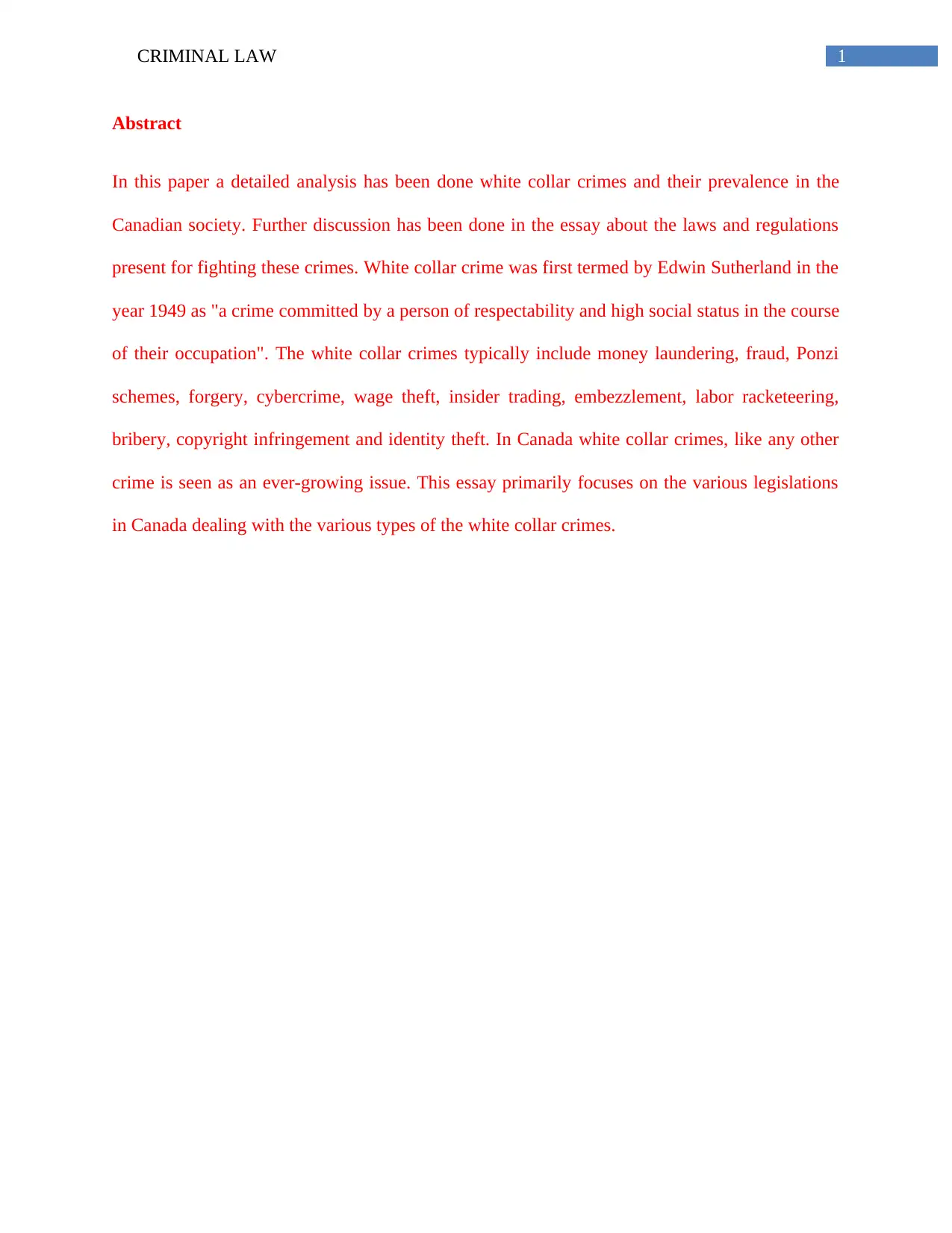
1CRIMINAL LAW
Abstract
In this paper a detailed analysis has been done white collar crimes and their prevalence in the
Canadian society. Further discussion has been done in the essay about the laws and regulations
present for fighting these crimes. White collar crime was first termed by Edwin Sutherland in the
year 1949 as "a crime committed by a person of respectability and high social status in the course
of their occupation". The white collar crimes typically include money laundering, fraud, Ponzi
schemes, forgery, cybercrime, wage theft, insider trading, embezzlement, labor racketeering,
bribery, copyright infringement and identity theft. In Canada white collar crimes, like any other
crime is seen as an ever-growing issue. This essay primarily focuses on the various legislations
in Canada dealing with the various types of the white collar crimes.
Abstract
In this paper a detailed analysis has been done white collar crimes and their prevalence in the
Canadian society. Further discussion has been done in the essay about the laws and regulations
present for fighting these crimes. White collar crime was first termed by Edwin Sutherland in the
year 1949 as "a crime committed by a person of respectability and high social status in the course
of their occupation". The white collar crimes typically include money laundering, fraud, Ponzi
schemes, forgery, cybercrime, wage theft, insider trading, embezzlement, labor racketeering,
bribery, copyright infringement and identity theft. In Canada white collar crimes, like any other
crime is seen as an ever-growing issue. This essay primarily focuses on the various legislations
in Canada dealing with the various types of the white collar crimes.
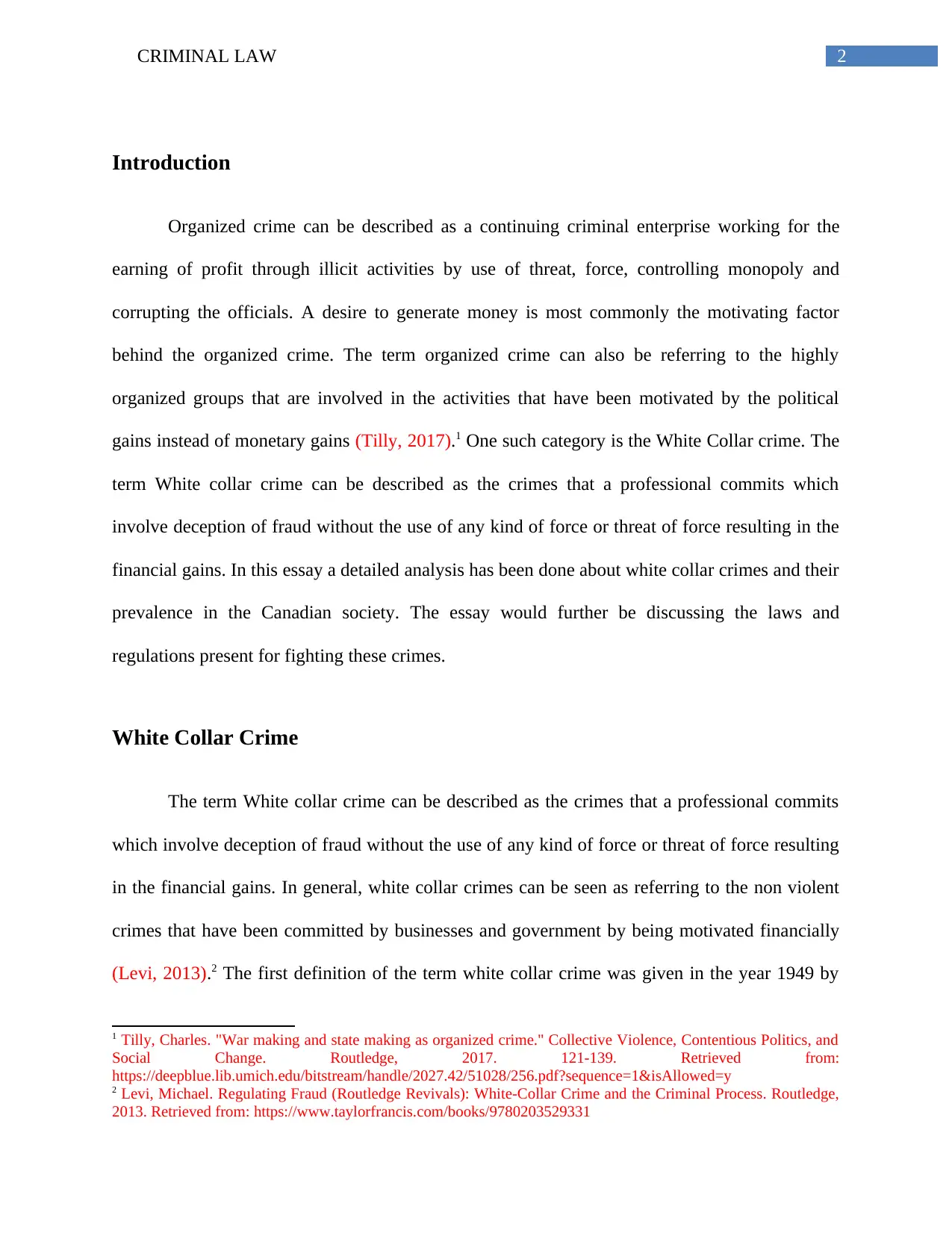
2CRIMINAL LAW
Introduction
Organized crime can be described as a continuing criminal enterprise working for the
earning of profit through illicit activities by use of threat, force, controlling monopoly and
corrupting the officials. A desire to generate money is most commonly the motivating factor
behind the organized crime. The term organized crime can also be referring to the highly
organized groups that are involved in the activities that have been motivated by the political
gains instead of monetary gains (Tilly, 2017).1 One such category is the White Collar crime. The
term White collar crime can be described as the crimes that a professional commits which
involve deception of fraud without the use of any kind of force or threat of force resulting in the
financial gains. In this essay a detailed analysis has been done about white collar crimes and their
prevalence in the Canadian society. The essay would further be discussing the laws and
regulations present for fighting these crimes.
White Collar Crime
The term White collar crime can be described as the crimes that a professional commits
which involve deception of fraud without the use of any kind of force or threat of force resulting
in the financial gains. In general, white collar crimes can be seen as referring to the non violent
crimes that have been committed by businesses and government by being motivated financially
(Levi, 2013).2 The first definition of the term white collar crime was given in the year 1949 by
1 Tilly, Charles. "War making and state making as organized crime." Collective Violence, Contentious Politics, and
Social Change. Routledge, 2017. 121-139. Retrieved from:
https://deepblue.lib.umich.edu/bitstream/handle/2027.42/51028/256.pdf?sequence=1&isAllowed=y
2 Levi, Michael. Regulating Fraud (Routledge Revivals): White-Collar Crime and the Criminal Process. Routledge,
2013. Retrieved from: https://www.taylorfrancis.com/books/9780203529331
Introduction
Organized crime can be described as a continuing criminal enterprise working for the
earning of profit through illicit activities by use of threat, force, controlling monopoly and
corrupting the officials. A desire to generate money is most commonly the motivating factor
behind the organized crime. The term organized crime can also be referring to the highly
organized groups that are involved in the activities that have been motivated by the political
gains instead of monetary gains (Tilly, 2017).1 One such category is the White Collar crime. The
term White collar crime can be described as the crimes that a professional commits which
involve deception of fraud without the use of any kind of force or threat of force resulting in the
financial gains. In this essay a detailed analysis has been done about white collar crimes and their
prevalence in the Canadian society. The essay would further be discussing the laws and
regulations present for fighting these crimes.
White Collar Crime
The term White collar crime can be described as the crimes that a professional commits
which involve deception of fraud without the use of any kind of force or threat of force resulting
in the financial gains. In general, white collar crimes can be seen as referring to the non violent
crimes that have been committed by businesses and government by being motivated financially
(Levi, 2013).2 The first definition of the term white collar crime was given in the year 1949 by
1 Tilly, Charles. "War making and state making as organized crime." Collective Violence, Contentious Politics, and
Social Change. Routledge, 2017. 121-139. Retrieved from:
https://deepblue.lib.umich.edu/bitstream/handle/2027.42/51028/256.pdf?sequence=1&isAllowed=y
2 Levi, Michael. Regulating Fraud (Routledge Revivals): White-Collar Crime and the Criminal Process. Routledge,
2013. Retrieved from: https://www.taylorfrancis.com/books/9780203529331
⊘ This is a preview!⊘
Do you want full access?
Subscribe today to unlock all pages.

Trusted by 1+ million students worldwide
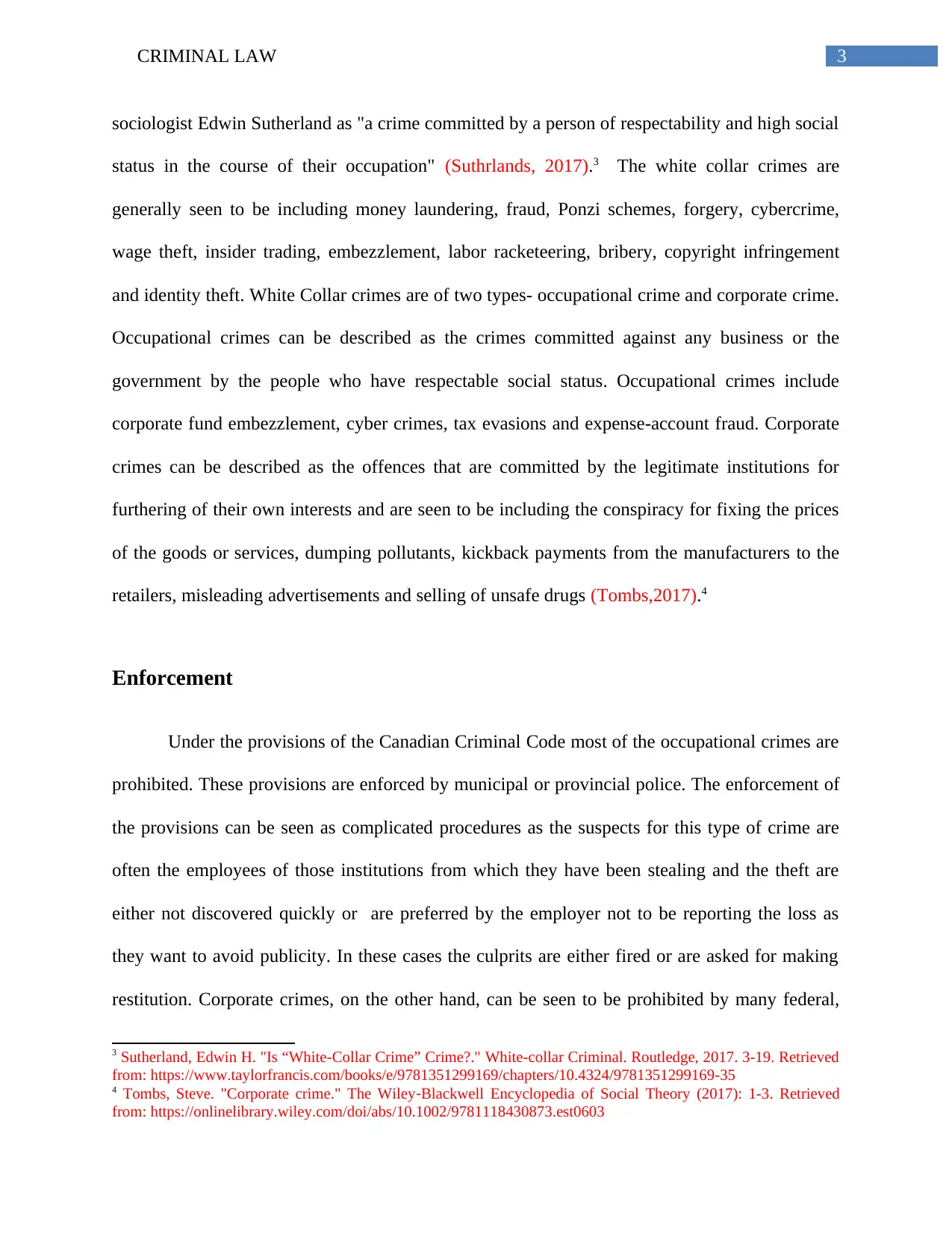
3CRIMINAL LAW
sociologist Edwin Sutherland as "a crime committed by a person of respectability and high social
status in the course of their occupation" (Suthrlands, 2017).3 The white collar crimes are
generally seen to be including money laundering, fraud, Ponzi schemes, forgery, cybercrime,
wage theft, insider trading, embezzlement, labor racketeering, bribery, copyright infringement
and identity theft. White Collar crimes are of two types- occupational crime and corporate crime.
Occupational crimes can be described as the crimes committed against any business or the
government by the people who have respectable social status. Occupational crimes include
corporate fund embezzlement, cyber crimes, tax evasions and expense-account fraud. Corporate
crimes can be described as the offences that are committed by the legitimate institutions for
furthering of their own interests and are seen to be including the conspiracy for fixing the prices
of the goods or services, dumping pollutants, kickback payments from the manufacturers to the
retailers, misleading advertisements and selling of unsafe drugs (Tombs,2017).4
Enforcement
Under the provisions of the Canadian Criminal Code most of the occupational crimes are
prohibited. These provisions are enforced by municipal or provincial police. The enforcement of
the provisions can be seen as complicated procedures as the suspects for this type of crime are
often the employees of those institutions from which they have been stealing and the theft are
either not discovered quickly or are preferred by the employer not to be reporting the loss as
they want to avoid publicity. In these cases the culprits are either fired or are asked for making
restitution. Corporate crimes, on the other hand, can be seen to be prohibited by many federal,
3 Sutherland, Edwin H. "Is “White-Collar Crime” Crime?." White-collar Criminal. Routledge, 2017. 3-19. Retrieved
from: https://www.taylorfrancis.com/books/e/9781351299169/chapters/10.4324/9781351299169-35
4 Tombs, Steve. "Corporate crime." The Wiley‐Blackwell Encyclopedia of Social Theory (2017): 1-3. Retrieved
from: https://onlinelibrary.wiley.com/doi/abs/10.1002/9781118430873.est0603
sociologist Edwin Sutherland as "a crime committed by a person of respectability and high social
status in the course of their occupation" (Suthrlands, 2017).3 The white collar crimes are
generally seen to be including money laundering, fraud, Ponzi schemes, forgery, cybercrime,
wage theft, insider trading, embezzlement, labor racketeering, bribery, copyright infringement
and identity theft. White Collar crimes are of two types- occupational crime and corporate crime.
Occupational crimes can be described as the crimes committed against any business or the
government by the people who have respectable social status. Occupational crimes include
corporate fund embezzlement, cyber crimes, tax evasions and expense-account fraud. Corporate
crimes can be described as the offences that are committed by the legitimate institutions for
furthering of their own interests and are seen to be including the conspiracy for fixing the prices
of the goods or services, dumping pollutants, kickback payments from the manufacturers to the
retailers, misleading advertisements and selling of unsafe drugs (Tombs,2017).4
Enforcement
Under the provisions of the Canadian Criminal Code most of the occupational crimes are
prohibited. These provisions are enforced by municipal or provincial police. The enforcement of
the provisions can be seen as complicated procedures as the suspects for this type of crime are
often the employees of those institutions from which they have been stealing and the theft are
either not discovered quickly or are preferred by the employer not to be reporting the loss as
they want to avoid publicity. In these cases the culprits are either fired or are asked for making
restitution. Corporate crimes, on the other hand, can be seen to be prohibited by many federal,
3 Sutherland, Edwin H. "Is “White-Collar Crime” Crime?." White-collar Criminal. Routledge, 2017. 3-19. Retrieved
from: https://www.taylorfrancis.com/books/e/9781351299169/chapters/10.4324/9781351299169-35
4 Tombs, Steve. "Corporate crime." The Wiley‐Blackwell Encyclopedia of Social Theory (2017): 1-3. Retrieved
from: https://onlinelibrary.wiley.com/doi/abs/10.1002/9781118430873.est0603
Paraphrase This Document
Need a fresh take? Get an instant paraphrase of this document with our AI Paraphraser
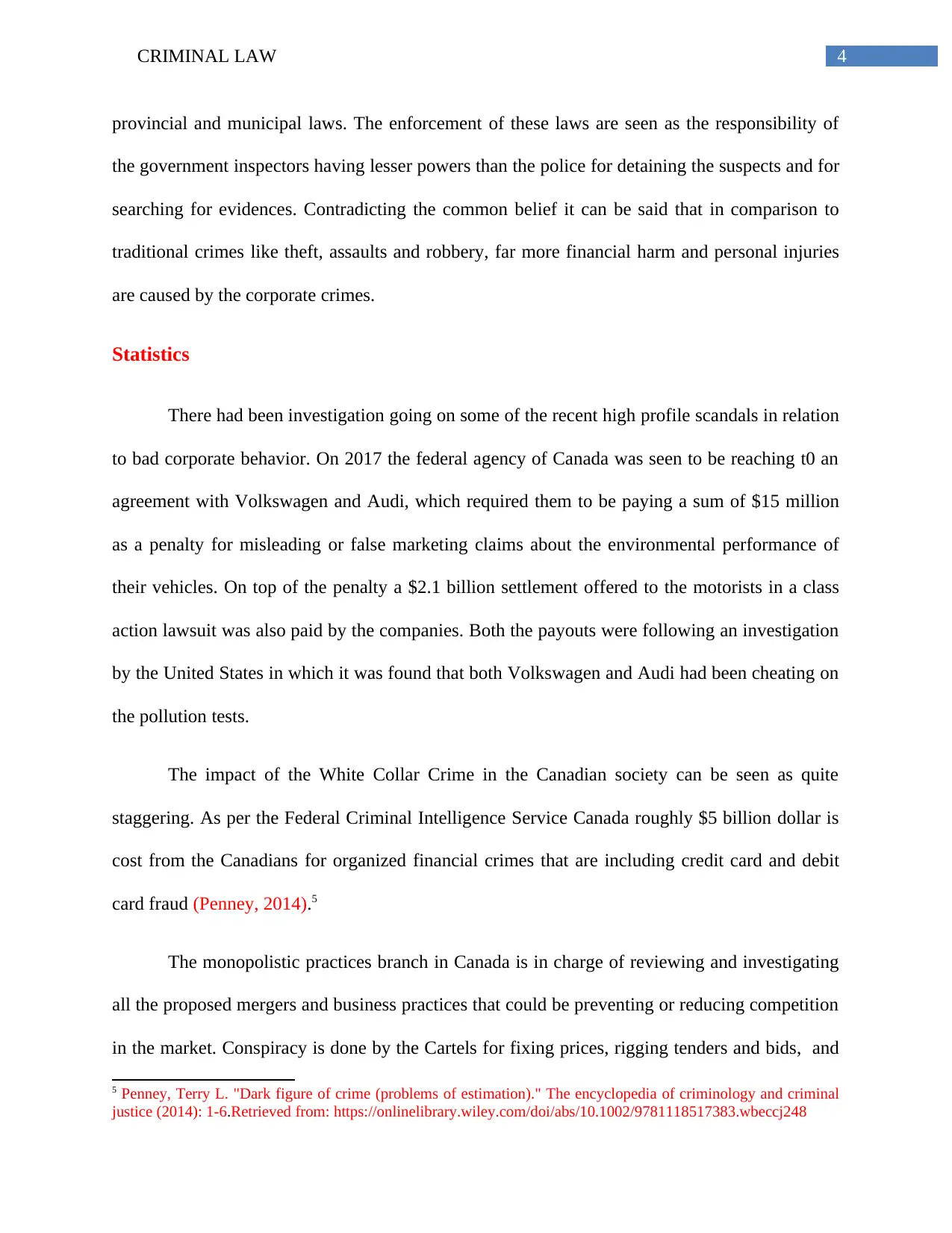
4CRIMINAL LAW
provincial and municipal laws. The enforcement of these laws are seen as the responsibility of
the government inspectors having lesser powers than the police for detaining the suspects and for
searching for evidences. Contradicting the common belief it can be said that in comparison to
traditional crimes like theft, assaults and robbery, far more financial harm and personal injuries
are caused by the corporate crimes.
Statistics
There had been investigation going on some of the recent high profile scandals in relation
to bad corporate behavior. On 2017 the federal agency of Canada was seen to be reaching t0 an
agreement with Volkswagen and Audi, which required them to be paying a sum of $15 million
as a penalty for misleading or false marketing claims about the environmental performance of
their vehicles. On top of the penalty a $2.1 billion settlement offered to the motorists in a class
action lawsuit was also paid by the companies. Both the payouts were following an investigation
by the United States in which it was found that both Volkswagen and Audi had been cheating on
the pollution tests.
The impact of the White Collar Crime in the Canadian society can be seen as quite
staggering. As per the Federal Criminal Intelligence Service Canada roughly $5 billion dollar is
cost from the Canadians for organized financial crimes that are including credit card and debit
card fraud (Penney, 2014).5
The monopolistic practices branch in Canada is in charge of reviewing and investigating
all the proposed mergers and business practices that could be preventing or reducing competition
in the market. Conspiracy is done by the Cartels for fixing prices, rigging tenders and bids, and
5 Penney, Terry L. "Dark figure of crime (problems of estimation)." The encyclopedia of criminology and criminal
justice (2014): 1-6.Retrieved from: https://onlinelibrary.wiley.com/doi/abs/10.1002/9781118517383.wbeccj248
provincial and municipal laws. The enforcement of these laws are seen as the responsibility of
the government inspectors having lesser powers than the police for detaining the suspects and for
searching for evidences. Contradicting the common belief it can be said that in comparison to
traditional crimes like theft, assaults and robbery, far more financial harm and personal injuries
are caused by the corporate crimes.
Statistics
There had been investigation going on some of the recent high profile scandals in relation
to bad corporate behavior. On 2017 the federal agency of Canada was seen to be reaching t0 an
agreement with Volkswagen and Audi, which required them to be paying a sum of $15 million
as a penalty for misleading or false marketing claims about the environmental performance of
their vehicles. On top of the penalty a $2.1 billion settlement offered to the motorists in a class
action lawsuit was also paid by the companies. Both the payouts were following an investigation
by the United States in which it was found that both Volkswagen and Audi had been cheating on
the pollution tests.
The impact of the White Collar Crime in the Canadian society can be seen as quite
staggering. As per the Federal Criminal Intelligence Service Canada roughly $5 billion dollar is
cost from the Canadians for organized financial crimes that are including credit card and debit
card fraud (Penney, 2014).5
The monopolistic practices branch in Canada is in charge of reviewing and investigating
all the proposed mergers and business practices that could be preventing or reducing competition
in the market. Conspiracy is done by the Cartels for fixing prices, rigging tenders and bids, and
5 Penney, Terry L. "Dark figure of crime (problems of estimation)." The encyclopedia of criminology and criminal
justice (2014): 1-6.Retrieved from: https://onlinelibrary.wiley.com/doi/abs/10.1002/9781118517383.wbeccj248
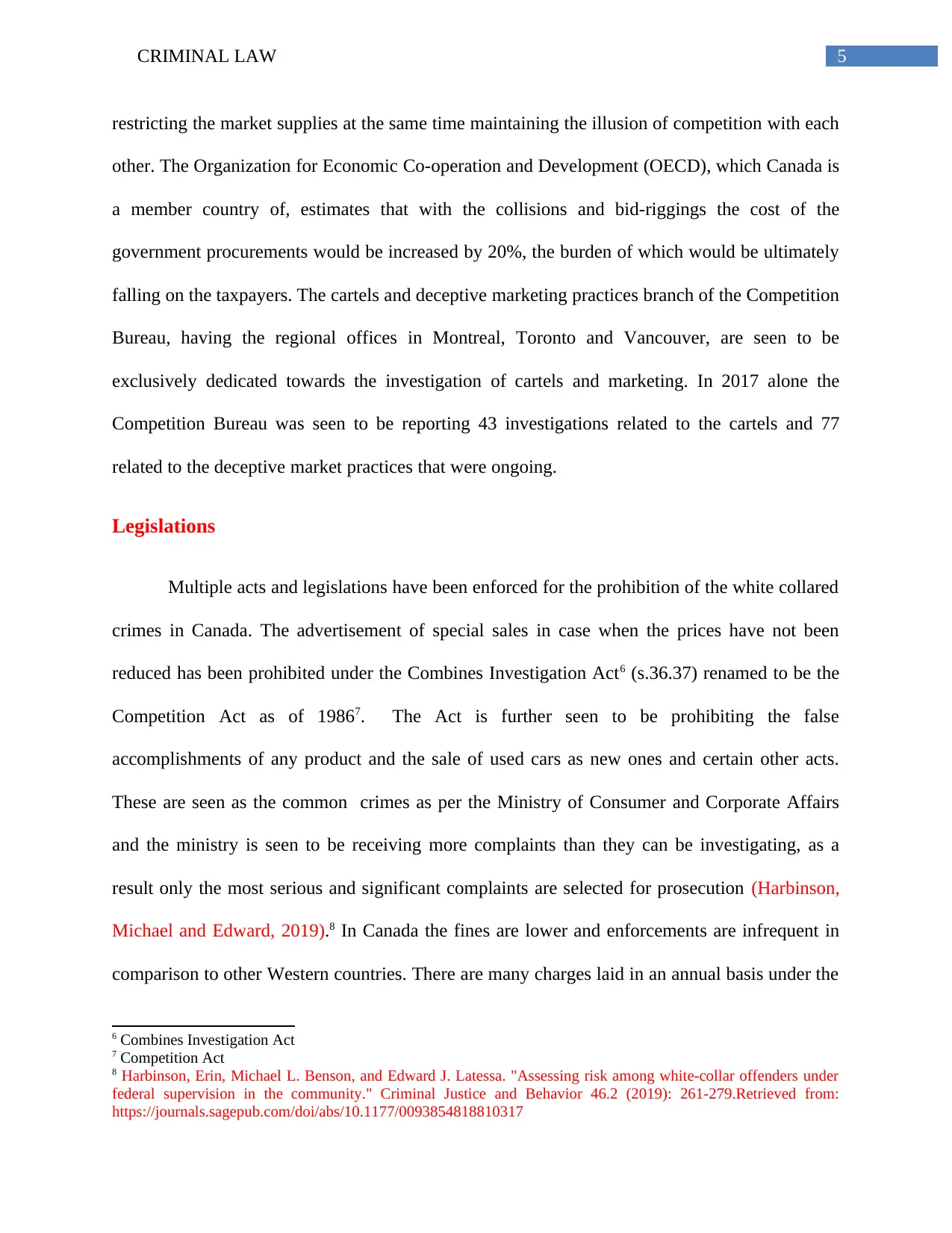
5CRIMINAL LAW
restricting the market supplies at the same time maintaining the illusion of competition with each
other. The Organization for Economic Co-operation and Development (OECD), which Canada is
a member country of, estimates that with the collisions and bid-riggings the cost of the
government procurements would be increased by 20%, the burden of which would be ultimately
falling on the taxpayers. The cartels and deceptive marketing practices branch of the Competition
Bureau, having the regional offices in Montreal, Toronto and Vancouver, are seen to be
exclusively dedicated towards the investigation of cartels and marketing. In 2017 alone the
Competition Bureau was seen to be reporting 43 investigations related to the cartels and 77
related to the deceptive market practices that were ongoing.
Legislations
Multiple acts and legislations have been enforced for the prohibition of the white collared
crimes in Canada. The advertisement of special sales in case when the prices have not been
reduced has been prohibited under the Combines Investigation Act6 (s.36.37) renamed to be the
Competition Act as of 19867. The Act is further seen to be prohibiting the false
accomplishments of any product and the sale of used cars as new ones and certain other acts.
These are seen as the common crimes as per the Ministry of Consumer and Corporate Affairs
and the ministry is seen to be receiving more complaints than they can be investigating, as a
result only the most serious and significant complaints are selected for prosecution (Harbinson,
Michael and Edward, 2019).8 In Canada the fines are lower and enforcements are infrequent in
comparison to other Western countries. There are many charges laid in an annual basis under the
6 Combines Investigation Act
7 Competition Act
8 Harbinson, Erin, Michael L. Benson, and Edward J. Latessa. "Assessing risk among white-collar offenders under
federal supervision in the community." Criminal Justice and Behavior 46.2 (2019): 261-279.Retrieved from:
https://journals.sagepub.com/doi/abs/10.1177/0093854818810317
restricting the market supplies at the same time maintaining the illusion of competition with each
other. The Organization for Economic Co-operation and Development (OECD), which Canada is
a member country of, estimates that with the collisions and bid-riggings the cost of the
government procurements would be increased by 20%, the burden of which would be ultimately
falling on the taxpayers. The cartels and deceptive marketing practices branch of the Competition
Bureau, having the regional offices in Montreal, Toronto and Vancouver, are seen to be
exclusively dedicated towards the investigation of cartels and marketing. In 2017 alone the
Competition Bureau was seen to be reporting 43 investigations related to the cartels and 77
related to the deceptive market practices that were ongoing.
Legislations
Multiple acts and legislations have been enforced for the prohibition of the white collared
crimes in Canada. The advertisement of special sales in case when the prices have not been
reduced has been prohibited under the Combines Investigation Act6 (s.36.37) renamed to be the
Competition Act as of 19867. The Act is further seen to be prohibiting the false
accomplishments of any product and the sale of used cars as new ones and certain other acts.
These are seen as the common crimes as per the Ministry of Consumer and Corporate Affairs
and the ministry is seen to be receiving more complaints than they can be investigating, as a
result only the most serious and significant complaints are selected for prosecution (Harbinson,
Michael and Edward, 2019).8 In Canada the fines are lower and enforcements are infrequent in
comparison to other Western countries. There are many charges laid in an annual basis under the
6 Combines Investigation Act
7 Competition Act
8 Harbinson, Erin, Michael L. Benson, and Edward J. Latessa. "Assessing risk among white-collar offenders under
federal supervision in the community." Criminal Justice and Behavior 46.2 (2019): 261-279.Retrieved from:
https://journals.sagepub.com/doi/abs/10.1177/0093854818810317
⊘ This is a preview!⊘
Do you want full access?
Subscribe today to unlock all pages.

Trusted by 1+ million students worldwide
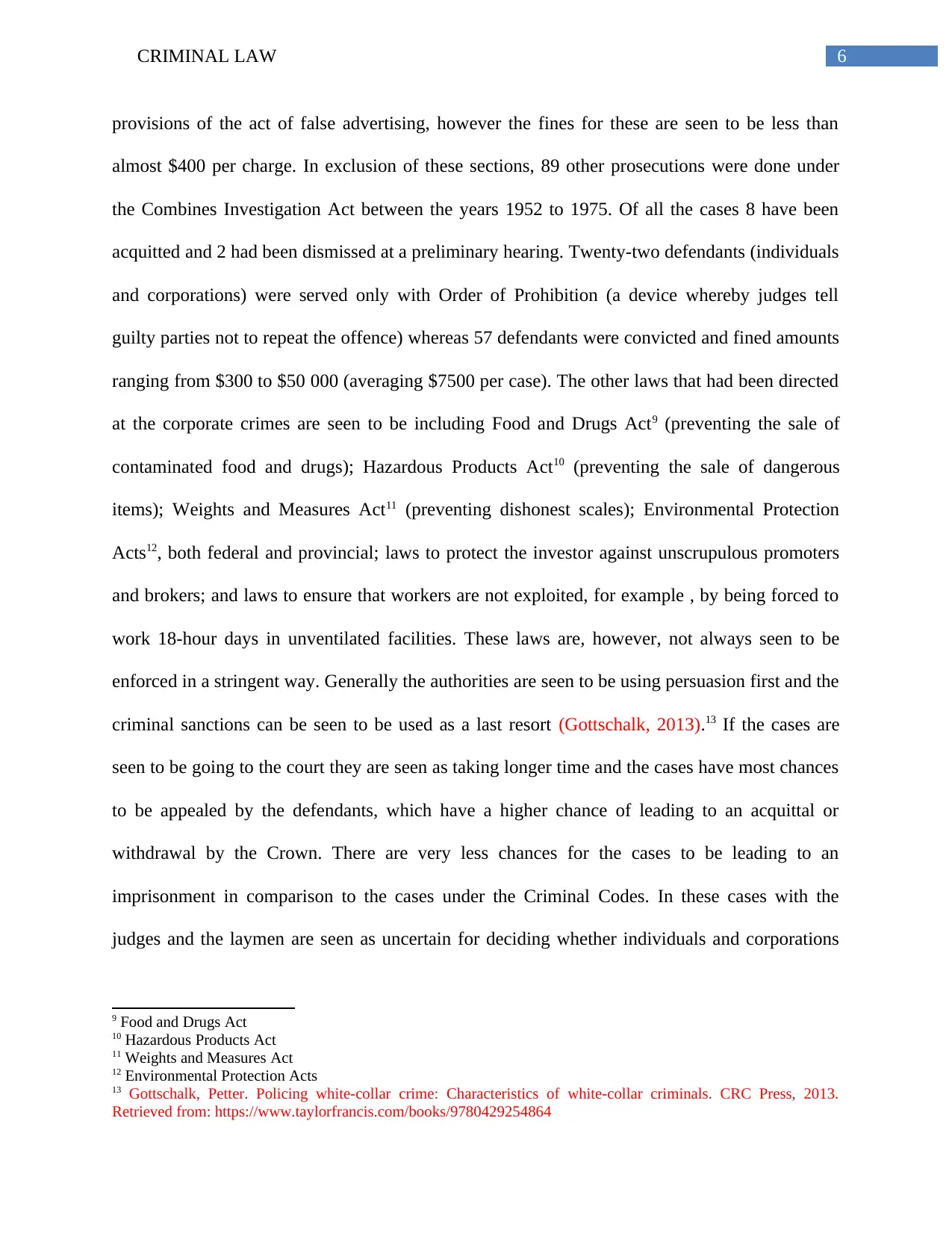
6CRIMINAL LAW
provisions of the act of false advertising, however the fines for these are seen to be less than
almost $400 per charge. In exclusion of these sections, 89 other prosecutions were done under
the Combines Investigation Act between the years 1952 to 1975. Of all the cases 8 have been
acquitted and 2 had been dismissed at a preliminary hearing. Twenty-two defendants (individuals
and corporations) were served only with Order of Prohibition (a device whereby judges tell
guilty parties not to repeat the offence) whereas 57 defendants were convicted and fined amounts
ranging from $300 to $50 000 (averaging $7500 per case). The other laws that had been directed
at the corporate crimes are seen to be including Food and Drugs Act9 (preventing the sale of
contaminated food and drugs); Hazardous Products Act10 (preventing the sale of dangerous
items); Weights and Measures Act11 (preventing dishonest scales); Environmental Protection
Acts12, both federal and provincial; laws to protect the investor against unscrupulous promoters
and brokers; and laws to ensure that workers are not exploited, for example , by being forced to
work 18-hour days in unventilated facilities. These laws are, however, not always seen to be
enforced in a stringent way. Generally the authorities are seen to be using persuasion first and the
criminal sanctions can be seen to be used as a last resort (Gottschalk, 2013).13 If the cases are
seen to be going to the court they are seen as taking longer time and the cases have most chances
to be appealed by the defendants, which have a higher chance of leading to an acquittal or
withdrawal by the Crown. There are very less chances for the cases to be leading to an
imprisonment in comparison to the cases under the Criminal Codes. In these cases with the
judges and the laymen are seen as uncertain for deciding whether individuals and corporations
9 Food and Drugs Act
10 Hazardous Products Act
11 Weights and Measures Act
12 Environmental Protection Acts
13 Gottschalk, Petter. Policing white-collar crime: Characteristics of white-collar criminals. CRC Press, 2013.
Retrieved from: https://www.taylorfrancis.com/books/9780429254864
provisions of the act of false advertising, however the fines for these are seen to be less than
almost $400 per charge. In exclusion of these sections, 89 other prosecutions were done under
the Combines Investigation Act between the years 1952 to 1975. Of all the cases 8 have been
acquitted and 2 had been dismissed at a preliminary hearing. Twenty-two defendants (individuals
and corporations) were served only with Order of Prohibition (a device whereby judges tell
guilty parties not to repeat the offence) whereas 57 defendants were convicted and fined amounts
ranging from $300 to $50 000 (averaging $7500 per case). The other laws that had been directed
at the corporate crimes are seen to be including Food and Drugs Act9 (preventing the sale of
contaminated food and drugs); Hazardous Products Act10 (preventing the sale of dangerous
items); Weights and Measures Act11 (preventing dishonest scales); Environmental Protection
Acts12, both federal and provincial; laws to protect the investor against unscrupulous promoters
and brokers; and laws to ensure that workers are not exploited, for example , by being forced to
work 18-hour days in unventilated facilities. These laws are, however, not always seen to be
enforced in a stringent way. Generally the authorities are seen to be using persuasion first and the
criminal sanctions can be seen to be used as a last resort (Gottschalk, 2013).13 If the cases are
seen to be going to the court they are seen as taking longer time and the cases have most chances
to be appealed by the defendants, which have a higher chance of leading to an acquittal or
withdrawal by the Crown. There are very less chances for the cases to be leading to an
imprisonment in comparison to the cases under the Criminal Codes. In these cases with the
judges and the laymen are seen as uncertain for deciding whether individuals and corporations
9 Food and Drugs Act
10 Hazardous Products Act
11 Weights and Measures Act
12 Environmental Protection Acts
13 Gottschalk, Petter. Policing white-collar crime: Characteristics of white-collar criminals. CRC Press, 2013.
Retrieved from: https://www.taylorfrancis.com/books/9780429254864
Paraphrase This Document
Need a fresh take? Get an instant paraphrase of this document with our AI Paraphraser
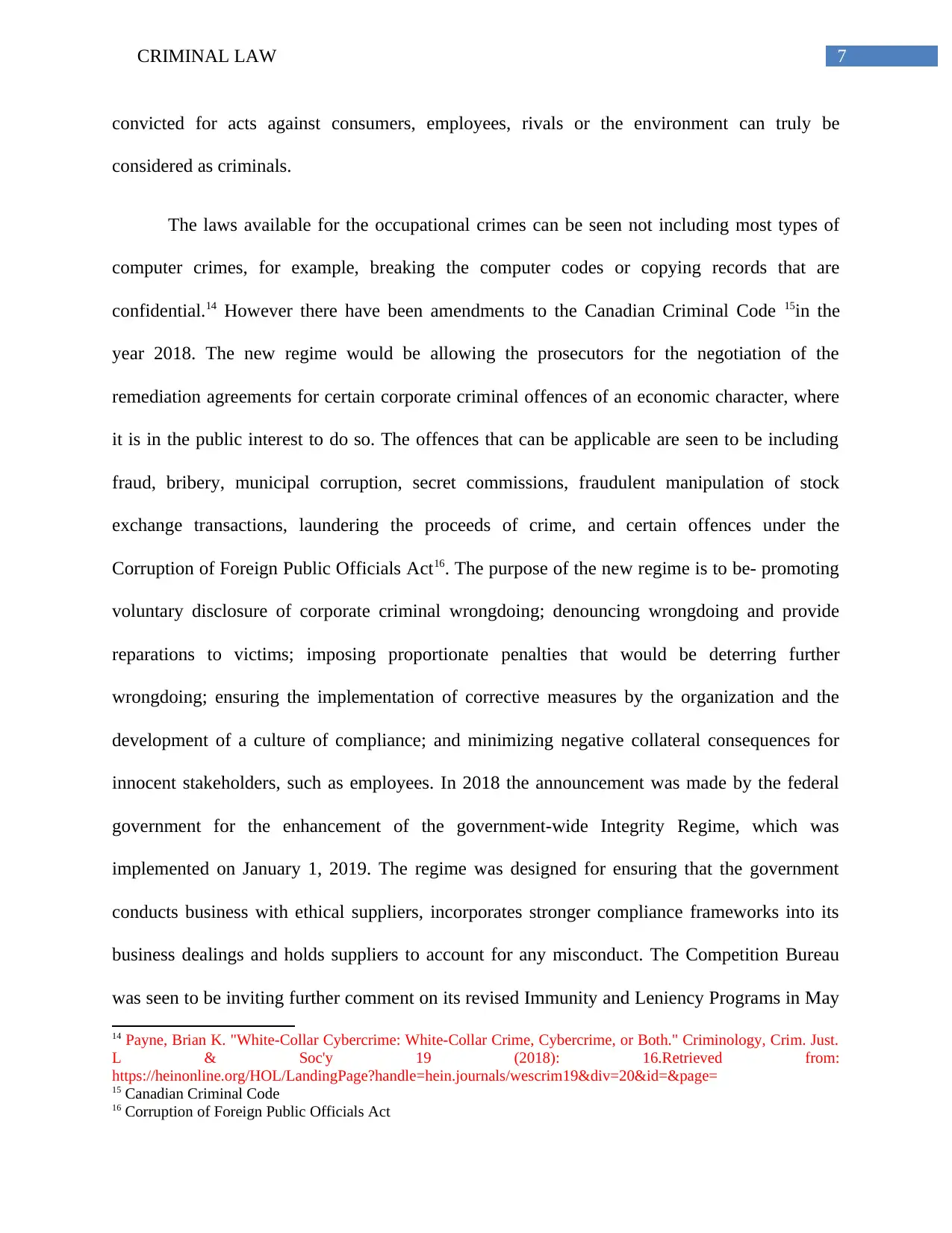
7CRIMINAL LAW
convicted for acts against consumers, employees, rivals or the environment can truly be
considered as criminals.
The laws available for the occupational crimes can be seen not including most types of
computer crimes, for example, breaking the computer codes or copying records that are
confidential.14 However there have been amendments to the Canadian Criminal Code 15in the
year 2018. The new regime would be allowing the prosecutors for the negotiation of the
remediation agreements for certain corporate criminal offences of an economic character, where
it is in the public interest to do so. The offences that can be applicable are seen to be including
fraud, bribery, municipal corruption, secret commissions, fraudulent manipulation of stock
exchange transactions, laundering the proceeds of crime, and certain offences under the
Corruption of Foreign Public Officials Act16. The purpose of the new regime is to be- promoting
voluntary disclosure of corporate criminal wrongdoing; denouncing wrongdoing and provide
reparations to victims; imposing proportionate penalties that would be deterring further
wrongdoing; ensuring the implementation of corrective measures by the organization and the
development of a culture of compliance; and minimizing negative collateral consequences for
innocent stakeholders, such as employees. In 2018 the announcement was made by the federal
government for the enhancement of the government-wide Integrity Regime, which was
implemented on January 1, 2019. The regime was designed for ensuring that the government
conducts business with ethical suppliers, incorporates stronger compliance frameworks into its
business dealings and holds suppliers to account for any misconduct. The Competition Bureau
was seen to be inviting further comment on its revised Immunity and Leniency Programs in May
14 Payne, Brian K. "White-Collar Cybercrime: White-Collar Crime, Cybercrime, or Both." Criminology, Crim. Just.
L & Soc'y 19 (2018): 16.Retrieved from:
https://heinonline.org/HOL/LandingPage?handle=hein.journals/wescrim19&div=20&id=&page=
15 Canadian Criminal Code
16 Corruption of Foreign Public Officials Act
convicted for acts against consumers, employees, rivals or the environment can truly be
considered as criminals.
The laws available for the occupational crimes can be seen not including most types of
computer crimes, for example, breaking the computer codes or copying records that are
confidential.14 However there have been amendments to the Canadian Criminal Code 15in the
year 2018. The new regime would be allowing the prosecutors for the negotiation of the
remediation agreements for certain corporate criminal offences of an economic character, where
it is in the public interest to do so. The offences that can be applicable are seen to be including
fraud, bribery, municipal corruption, secret commissions, fraudulent manipulation of stock
exchange transactions, laundering the proceeds of crime, and certain offences under the
Corruption of Foreign Public Officials Act16. The purpose of the new regime is to be- promoting
voluntary disclosure of corporate criminal wrongdoing; denouncing wrongdoing and provide
reparations to victims; imposing proportionate penalties that would be deterring further
wrongdoing; ensuring the implementation of corrective measures by the organization and the
development of a culture of compliance; and minimizing negative collateral consequences for
innocent stakeholders, such as employees. In 2018 the announcement was made by the federal
government for the enhancement of the government-wide Integrity Regime, which was
implemented on January 1, 2019. The regime was designed for ensuring that the government
conducts business with ethical suppliers, incorporates stronger compliance frameworks into its
business dealings and holds suppliers to account for any misconduct. The Competition Bureau
was seen to be inviting further comment on its revised Immunity and Leniency Programs in May
14 Payne, Brian K. "White-Collar Cybercrime: White-Collar Crime, Cybercrime, or Both." Criminology, Crim. Just.
L & Soc'y 19 (2018): 16.Retrieved from:
https://heinonline.org/HOL/LandingPage?handle=hein.journals/wescrim19&div=20&id=&page=
15 Canadian Criminal Code
16 Corruption of Foreign Public Officials Act
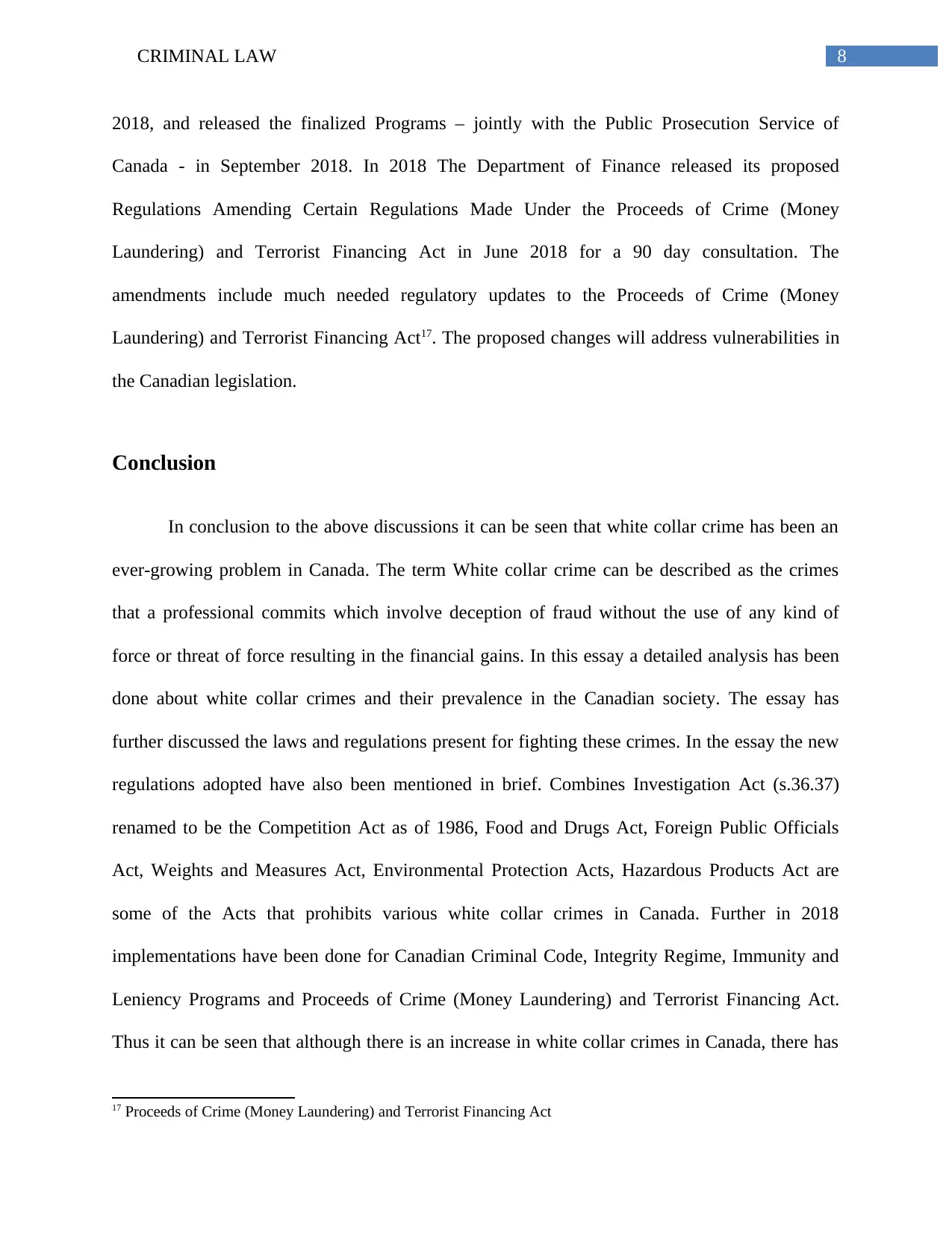
8CRIMINAL LAW
2018, and released the finalized Programs – jointly with the Public Prosecution Service of
Canada - in September 2018. In 2018 The Department of Finance released its proposed
Regulations Amending Certain Regulations Made Under the Proceeds of Crime (Money
Laundering) and Terrorist Financing Act in June 2018 for a 90 day consultation. The
amendments include much needed regulatory updates to the Proceeds of Crime (Money
Laundering) and Terrorist Financing Act17. The proposed changes will address vulnerabilities in
the Canadian legislation.
Conclusion
In conclusion to the above discussions it can be seen that white collar crime has been an
ever-growing problem in Canada. The term White collar crime can be described as the crimes
that a professional commits which involve deception of fraud without the use of any kind of
force or threat of force resulting in the financial gains. In this essay a detailed analysis has been
done about white collar crimes and their prevalence in the Canadian society. The essay has
further discussed the laws and regulations present for fighting these crimes. In the essay the new
regulations adopted have also been mentioned in brief. Combines Investigation Act (s.36.37)
renamed to be the Competition Act as of 1986, Food and Drugs Act, Foreign Public Officials
Act, Weights and Measures Act, Environmental Protection Acts, Hazardous Products Act are
some of the Acts that prohibits various white collar crimes in Canada. Further in 2018
implementations have been done for Canadian Criminal Code, Integrity Regime, Immunity and
Leniency Programs and Proceeds of Crime (Money Laundering) and Terrorist Financing Act.
Thus it can be seen that although there is an increase in white collar crimes in Canada, there has
17 Proceeds of Crime (Money Laundering) and Terrorist Financing Act
2018, and released the finalized Programs – jointly with the Public Prosecution Service of
Canada - in September 2018. In 2018 The Department of Finance released its proposed
Regulations Amending Certain Regulations Made Under the Proceeds of Crime (Money
Laundering) and Terrorist Financing Act in June 2018 for a 90 day consultation. The
amendments include much needed regulatory updates to the Proceeds of Crime (Money
Laundering) and Terrorist Financing Act17. The proposed changes will address vulnerabilities in
the Canadian legislation.
Conclusion
In conclusion to the above discussions it can be seen that white collar crime has been an
ever-growing problem in Canada. The term White collar crime can be described as the crimes
that a professional commits which involve deception of fraud without the use of any kind of
force or threat of force resulting in the financial gains. In this essay a detailed analysis has been
done about white collar crimes and their prevalence in the Canadian society. The essay has
further discussed the laws and regulations present for fighting these crimes. In the essay the new
regulations adopted have also been mentioned in brief. Combines Investigation Act (s.36.37)
renamed to be the Competition Act as of 1986, Food and Drugs Act, Foreign Public Officials
Act, Weights and Measures Act, Environmental Protection Acts, Hazardous Products Act are
some of the Acts that prohibits various white collar crimes in Canada. Further in 2018
implementations have been done for Canadian Criminal Code, Integrity Regime, Immunity and
Leniency Programs and Proceeds of Crime (Money Laundering) and Terrorist Financing Act.
Thus it can be seen that although there is an increase in white collar crimes in Canada, there has
17 Proceeds of Crime (Money Laundering) and Terrorist Financing Act
⊘ This is a preview!⊘
Do you want full access?
Subscribe today to unlock all pages.

Trusted by 1+ million students worldwide
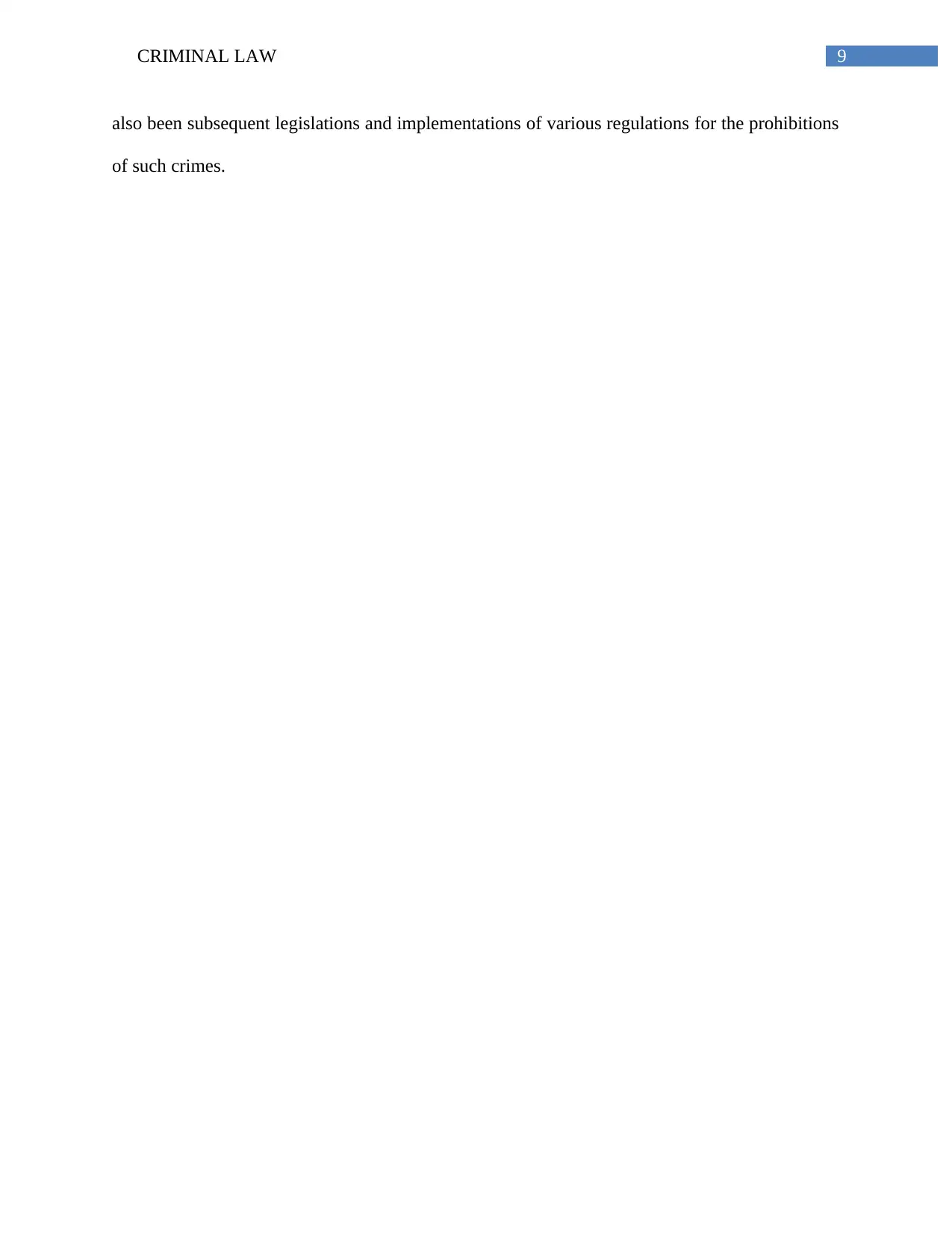
9CRIMINAL LAW
also been subsequent legislations and implementations of various regulations for the prohibitions
of such crimes.
also been subsequent legislations and implementations of various regulations for the prohibitions
of such crimes.
Paraphrase This Document
Need a fresh take? Get an instant paraphrase of this document with our AI Paraphraser
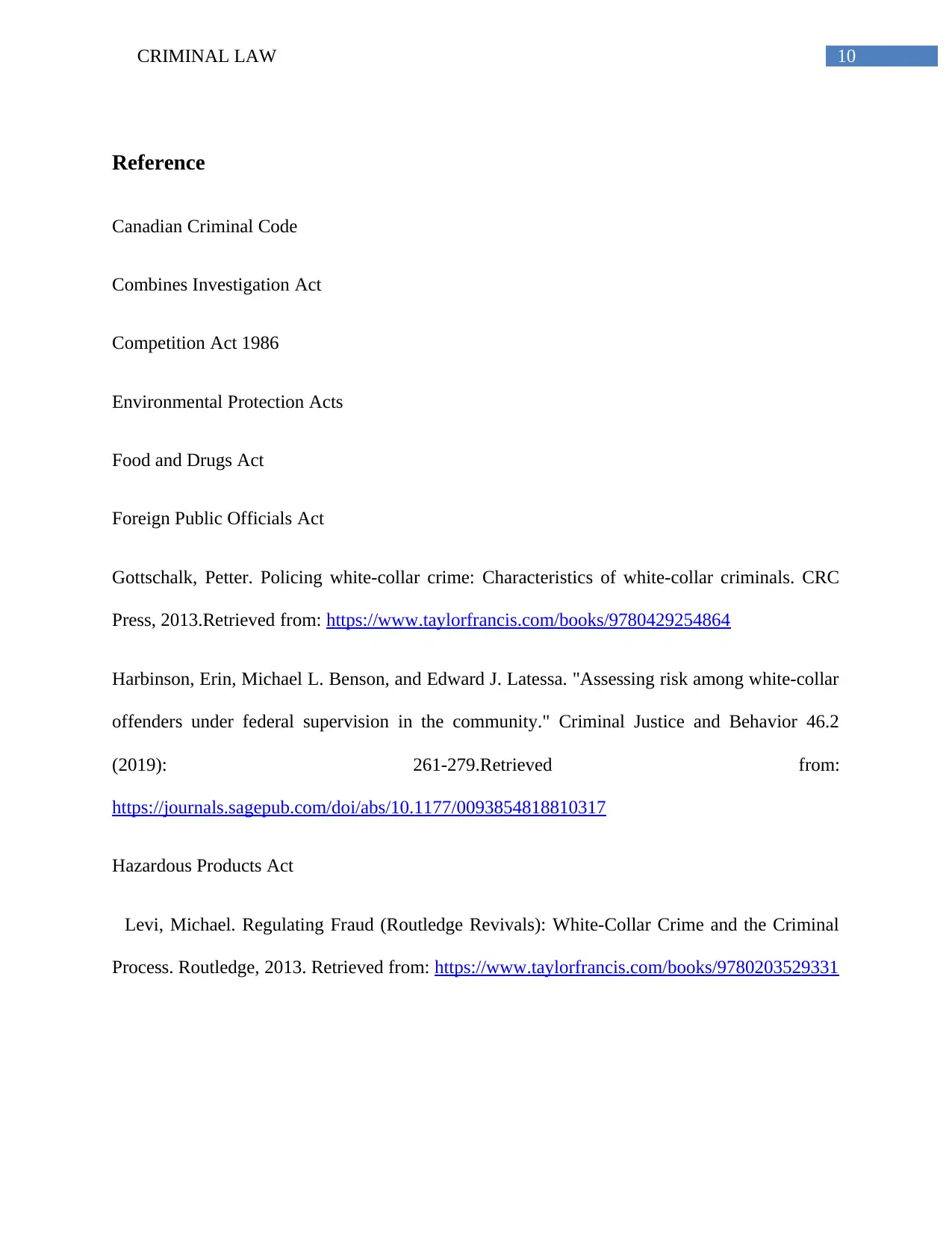
10CRIMINAL LAW
Reference
Canadian Criminal Code
Combines Investigation Act
Competition Act 1986
Environmental Protection Acts
Food and Drugs Act
Foreign Public Officials Act
Gottschalk, Petter. Policing white-collar crime: Characteristics of white-collar criminals. CRC
Press, 2013.Retrieved from: https://www.taylorfrancis.com/books/9780429254864
Harbinson, Erin, Michael L. Benson, and Edward J. Latessa. "Assessing risk among white-collar
offenders under federal supervision in the community." Criminal Justice and Behavior 46.2
(2019): 261-279.Retrieved from:
https://journals.sagepub.com/doi/abs/10.1177/0093854818810317
Hazardous Products Act
Levi, Michael. Regulating Fraud (Routledge Revivals): White-Collar Crime and the Criminal
Process. Routledge, 2013. Retrieved from: https://www.taylorfrancis.com/books/9780203529331
Reference
Canadian Criminal Code
Combines Investigation Act
Competition Act 1986
Environmental Protection Acts
Food and Drugs Act
Foreign Public Officials Act
Gottschalk, Petter. Policing white-collar crime: Characteristics of white-collar criminals. CRC
Press, 2013.Retrieved from: https://www.taylorfrancis.com/books/9780429254864
Harbinson, Erin, Michael L. Benson, and Edward J. Latessa. "Assessing risk among white-collar
offenders under federal supervision in the community." Criminal Justice and Behavior 46.2
(2019): 261-279.Retrieved from:
https://journals.sagepub.com/doi/abs/10.1177/0093854818810317
Hazardous Products Act
Levi, Michael. Regulating Fraud (Routledge Revivals): White-Collar Crime and the Criminal
Process. Routledge, 2013. Retrieved from: https://www.taylorfrancis.com/books/9780203529331
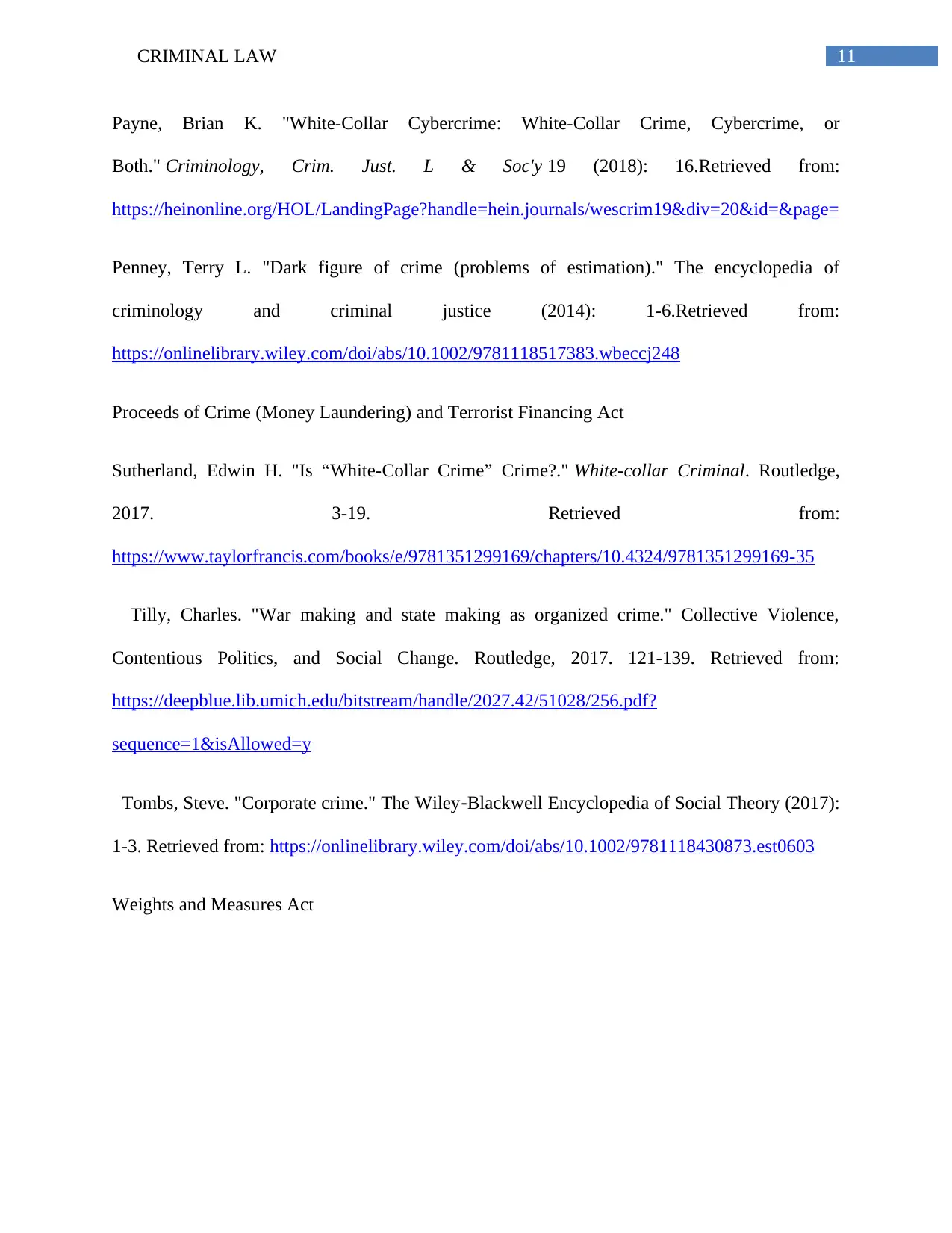
11CRIMINAL LAW
Payne, Brian K. "White-Collar Cybercrime: White-Collar Crime, Cybercrime, or
Both." Criminology, Crim. Just. L & Soc'y 19 (2018): 16.Retrieved from:
https://heinonline.org/HOL/LandingPage?handle=hein.journals/wescrim19&div=20&id=&page=
Penney, Terry L. "Dark figure of crime (problems of estimation)." The encyclopedia of
criminology and criminal justice (2014): 1-6.Retrieved from:
https://onlinelibrary.wiley.com/doi/abs/10.1002/9781118517383.wbeccj248
Proceeds of Crime (Money Laundering) and Terrorist Financing Act
Sutherland, Edwin H. "Is “White-Collar Crime” Crime?." White-collar Criminal. Routledge,
2017. 3-19. Retrieved from:
https://www.taylorfrancis.com/books/e/9781351299169/chapters/10.4324/9781351299169-35
Tilly, Charles. "War making and state making as organized crime." Collective Violence,
Contentious Politics, and Social Change. Routledge, 2017. 121-139. Retrieved from:
https://deepblue.lib.umich.edu/bitstream/handle/2027.42/51028/256.pdf?
sequence=1&isAllowed=y
Tombs, Steve. "Corporate crime." The Wiley‐Blackwell Encyclopedia of Social Theory (2017):
1-3. Retrieved from: https://onlinelibrary.wiley.com/doi/abs/10.1002/9781118430873.est0603
Weights and Measures Act
Payne, Brian K. "White-Collar Cybercrime: White-Collar Crime, Cybercrime, or
Both." Criminology, Crim. Just. L & Soc'y 19 (2018): 16.Retrieved from:
https://heinonline.org/HOL/LandingPage?handle=hein.journals/wescrim19&div=20&id=&page=
Penney, Terry L. "Dark figure of crime (problems of estimation)." The encyclopedia of
criminology and criminal justice (2014): 1-6.Retrieved from:
https://onlinelibrary.wiley.com/doi/abs/10.1002/9781118517383.wbeccj248
Proceeds of Crime (Money Laundering) and Terrorist Financing Act
Sutherland, Edwin H. "Is “White-Collar Crime” Crime?." White-collar Criminal. Routledge,
2017. 3-19. Retrieved from:
https://www.taylorfrancis.com/books/e/9781351299169/chapters/10.4324/9781351299169-35
Tilly, Charles. "War making and state making as organized crime." Collective Violence,
Contentious Politics, and Social Change. Routledge, 2017. 121-139. Retrieved from:
https://deepblue.lib.umich.edu/bitstream/handle/2027.42/51028/256.pdf?
sequence=1&isAllowed=y
Tombs, Steve. "Corporate crime." The Wiley‐Blackwell Encyclopedia of Social Theory (2017):
1-3. Retrieved from: https://onlinelibrary.wiley.com/doi/abs/10.1002/9781118430873.est0603
Weights and Measures Act
⊘ This is a preview!⊘
Do you want full access?
Subscribe today to unlock all pages.

Trusted by 1+ million students worldwide
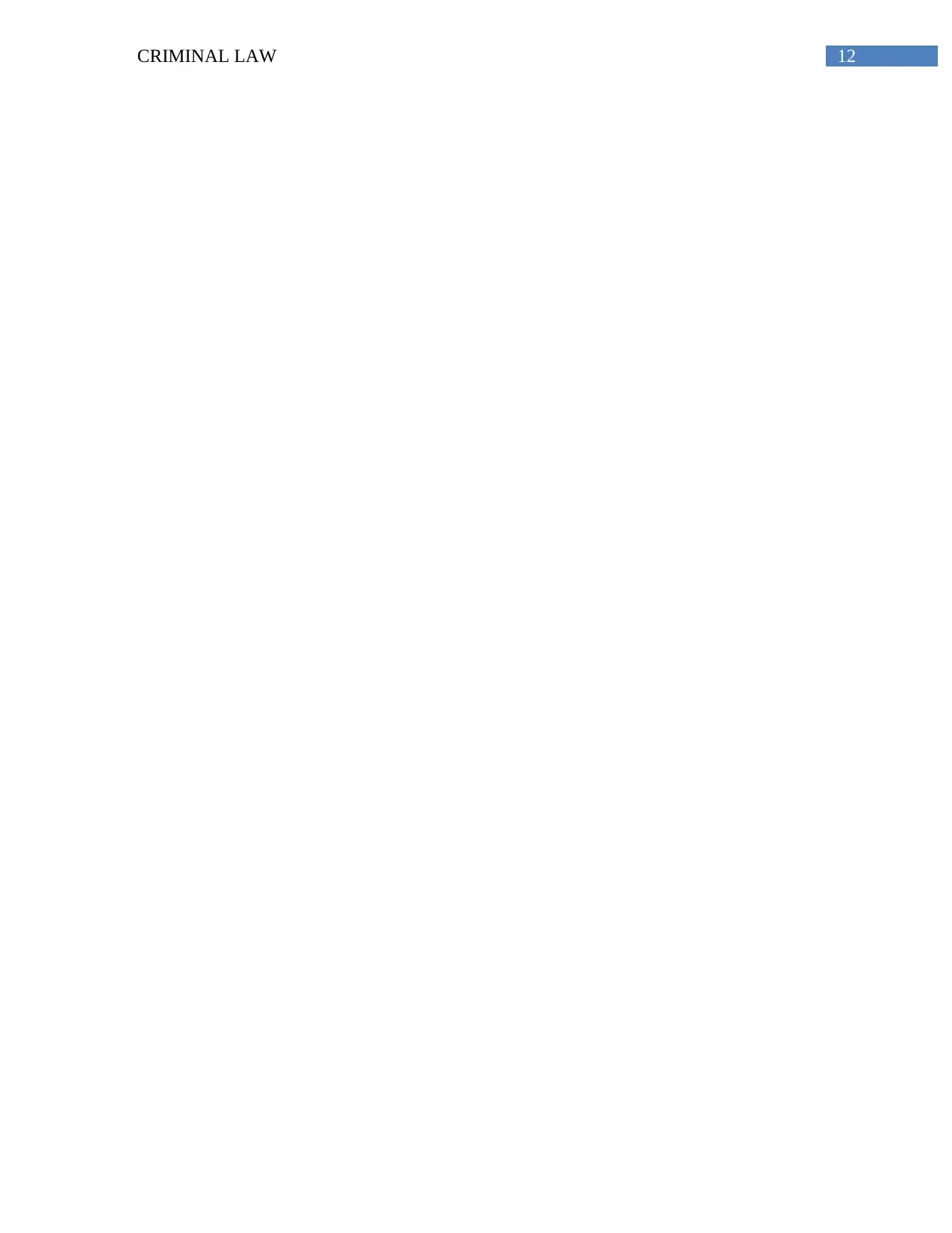
12CRIMINAL LAW
1 out of 13
Related Documents
Your All-in-One AI-Powered Toolkit for Academic Success.
+13062052269
info@desklib.com
Available 24*7 on WhatsApp / Email
![[object Object]](/_next/static/media/star-bottom.7253800d.svg)
Unlock your academic potential
© 2024 | Zucol Services PVT LTD | All rights reserved.





